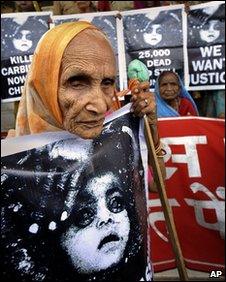India to revisit response to Bhopal leak, ministers say
- Published

Thousands of people were affected by the gas leak in December 1984
Indian cabinet ministers are recommending that the government do more to help victims of the 1984 Bhopal gas disaster.
The move follows public outrage after seven former managers at the plant were given two-year jail sentences.
The convictions are the first since the disaster at the Union Carbide plant - considered to be the world's worst industrial accident.
Some 3,500 people died within days and more than 15,000 in the years since.
Amid rising public and media pressure the government appointed a group of senior ministers to look again at issues such as compensation for those affected, and what to do about continued pollution at the now abandoned plant.
Briefing reporters after a two-hour-long meeting in Delhi, Home Minister P Chidambaram said the panel of senior ministers had dealt with all issues concerning the accident.
He said the meeting discussed "compensation to victims, legal issues including pursing the extradition of Warren Anderson [the then chairman of the US-based Union Carbide parent group] and... health-related matters".
"Our focus now is bringing relief to the victims of the ghastly tragedy," Mr Chidambaram said. "Thousands continue to suffer, and the government is sympathetic to their plight."
Mr Chidambaram said the cabinet would consider the recommendations on Friday.
The Reuters news agency quoted an unnamed government minister as saying that India may ask its courts to examine whether US company Dow Chemicals could be held liable for the damages.
Twenty years ago Union Carbide paid $470m (£282m) in compensation to the Indian government.
Dow Chemicals, which bought the company in 1999, says this settlement resolved all existing and future claims against the company.
Correspondents say the fact that the Bhopal tragedy is back in the news at the same time as the huge oil spill in the Gulf of Mexico has added to the sense that victims of the 1984 disaster have been terribly let down.
Commentators in India have pointed out that the US government appears far more concerned about a disaster in its own back yard than one which took place years ago in the developing world.
There has also been trenchant criticism of the Indian government response over the years, and of Union Carbide - now owned by Dow Chemicals - for failing to do more to help.
An extradition treaty does exist between India and the United States - but so far all requests by India for Warren Anderson's extradition have been turned down by the American government.
- Published8 June 2010
- Published7 June 2010